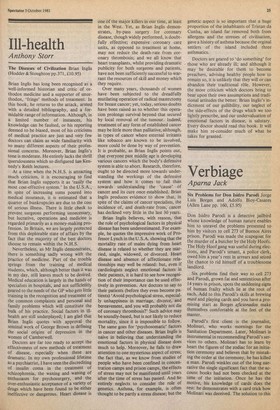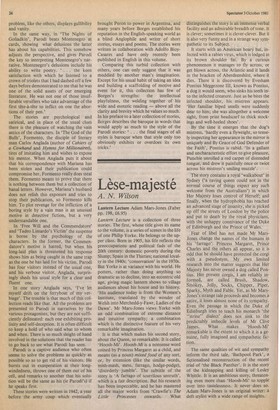Verbiage
Aparna Jack
Six Problems for Don Isidro Parodi Jorge Luis Borges and Adolfo Bioy-Casares (Allen Lane pp. 160, £5.95) Don Isidro Parodi is a detective jailbird whose knowledge of human nature enables him to unravel the problems presented to him by visitors to cell 273 of Buenos Aires prison. Parodi was made the scapegoat for the murder of a butcher by the Holy Hoofs. The Holy Hoof gang was useful during elections, and Parodi's tenant, a police clerk, owed him a year's rent in arrears and seized the chance to rid himself of a troublesome landlord.
Six problems find their way to cell 273 and Parodi, grown fat and sententious after 14 years in prison, spots the saddening signs of human frailty which lie at the root of each. Add to this Parodi's skills at brewing mate and playing cards and you have a promising start as Borges aficionados make themselves comfortable at the feet of the master.
Parodi's first client is the journalist, Molinari, who works mornings for the Sanitation Department. Later, Molinari is instrumental in recommending Parodi's services to others. Molinari has to learn by heart the figures of the zodiac for an initiation ceremony and believes that by mistaking the order at the ceremony, he has killed a man. Parodi winkles out of the long narrative the single significant fact that the account books had not been checked at the time of the initiation. Once he has the motive, his knowledge of cards does the rest: he demonstrates with a card trick how Molinari was deceived. The solution to this problem, like the others, displays gullibility and vanity.
In the same way, in 'The Nights of Goliadkin', Parodi beats Montenegro at cards, showing what delusions the latter has about his capabilities. This somehow adjusts the perspective, and gives Parodi the key to interpreting Montenegro's narrative. Montenegro's delusions include his ability to write poetry. . . . the keen satisfaction with which he listened to a crown of triolets that I had dashed off a few days before demonstrated to me that he was one of the solid assets of our emerging literature. He was not one of those insufferable versifiers who take advantage of the first tete-a-tete to inflict on one the abortions of their pen.'
The stories are psychological and satirical, and in place of the usual clues there is the pleasure of watching the vain antics of the characters. In 'The God of the Bulls', Formento, the disciple of literary man Carlos Anglada (author of Cahiers of a Cowhand and Hymns for Millionaires), tires of imitating him and wishes to expose his mentor. When Anglada puts it about that his correspondence with Mariana has been stolen and their publication could compromise her, Formento really does steal them. Formento means to prove that there is nothing between them but a collection of banal letters. However, Mariana's husband does not relish this exposure and tries to stop their publication, so Formento kills him. To plot revenge for the infliction of a boring style by a vain man is an unusual motive in detective fiction, but a very understandable one.
In 'Free Will and the Commendatore' and `Tadeo Limardo's Victim' the suspense is borne by the psychology of the characters. In the former, the Commendatore's motive is hatred, but when his long-laid plan is threatened his response shows him as being caught in the same trap as the one he has laid for his victim. Parodi has four visitors instead of the usual one, and his verbose visitor, Anglada, surprisingly sheds his usual style for a clear and fluent one.
In one story Anglada says, 'I've let myself drift on the ferryboat of my verbiage'. The trouble is that much of this collection reads like that. All the problems are presented to Parodi in narratives by the various protagonists, but they are not sufficiently delineated: each one exhibiting prolixity and self-deception. It is often difficult to keep a hold of who said what to whom and when. There is so much sleight of hand involved in the solutions that the reader has to go back to see what Parodi has seen.
Parodi is a captive audience who often seems to solve the problems as quickly as possible so as to get rid of his visitors. He bursts out in exasperation at their longwindedness, throws one of them out of his cell, and remarks to another that his solution will be the same as his (ie Parodi's) if he speaks first.
These stories were written in 1942, a year before the army coup which eventually brought Peron to power in Argentina, and many years before Borges established his reputation in the English-speaking world as a blind Anglophile and writer of short stories, essays and poems. The stories were written in collaboration with Adolfo BioyCasares and have only recently been published in English in this volume.
Comparing this turbid collection with others, one can only suggest that it was muddied by another man's imagination. Except for his usual habit of taking an idea and building a scaffolding of motive and event for it, this collection has few of Borges's strengths: the intellectual playfulness, the welding together of his wide and esoteric reading — above all the clarity and brevity which he values so much. In his preface to a later collection of stories, Borges describes the baroque in words that would apply as much to the style of the Parodi stories: . . . the final stages of all styles is baroque when that style only too obviously exhibits or overdoes its own tricks.'







































 Previous page
Previous page